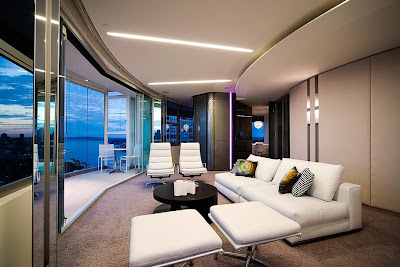Interior decorating has often been a tricky subject for renters. How much effort does one want to go through to improve a space that one doesn't actually own? Luckily, most interior decorating concerns non-structural work that focuses on color and furniture layout. Still, renter decorators tend to seek quicker, cheaper solutions to their decoration challenges than their home owner counterparts. In big cities where rents are high and space is at a premium, this difference is even more pronounced. In fact, the hipper the neighborhood, the more creative you have to be.
< imageanchor="1" style="margin-left: 1em; margin-right: 1em;">

< imageanchor="1" style="margin-left: 1em; margin-right: 1em;">

< imageanchor="1" style="margin-left: 1em; margin-right: 1em;">

< imageanchor="1" style="margin-left: 1em; margin-right: 1em;">

< imageanchor="1" style="margin-left: 1em; margin-right: 1em;">

< imageanchor="1" style="margin-left: 1em; margin-right: 1em;">

Get it off the ground:
It's an unforgiving rule of nature: the more fashionable the neighborhood, the higher the rent and the smaller the space. If you were to put the furniture from a one bedroom apartment from Des Moines Iowa into a one bedroom apartment in the West Village, chances are you wouldn't be able to take a step without bumping into something. New city arrivals quickly learn to mount bookshelves on the wall whenever possible and minimize the amount of four legged furniture items that take up precious floor space. Urban furniture stores address this with décor designed for this purpose. Even if you can't afford a swanky thin, modular bookshelf, they are fairly easy to build on your own. One friend of mine faced with budget and space restrictions came up with the imaginative idea of building bookshelves that hang on a series of 30 degree angles; creating a zig zag effect that made me wonder why it had never been done before, as they say "Necessity is the mother of invention". Even beds can be wall mounted, designed to swing down from the wall when needed. The classic Murphy bed is a good example.
Using Mirrors:
Many small restaurants employ the technique of using mirrors to make their space appear larger. Mirrors reflect light and, as a result, double the perception of depth in a given room. Mirrors are available in a broad variety of shapes, sizes and frames. Pick out a mirror design that works best for your given wall space. You can even get a pair of mirrors and mount them opposite one another for compounded reflections that create an even larger perception of space. Remember, in the world of interior design, perception is nine tenths reality.
Two Spaces In One:
A great tip for addressing the storage problems of a small space is to elevate the bed. Once elevated, the space beneath the bed can become an ideal storage area. The higher your ceiling, the more elevation (and thus storage) you can get away with. Another great small apartment item is the travel trunk. Get a large trunk, put it by a window, throw a few pillows on it, and presto, you've got window seating area with a little touch of adventure.
No comments:
Post a Comment